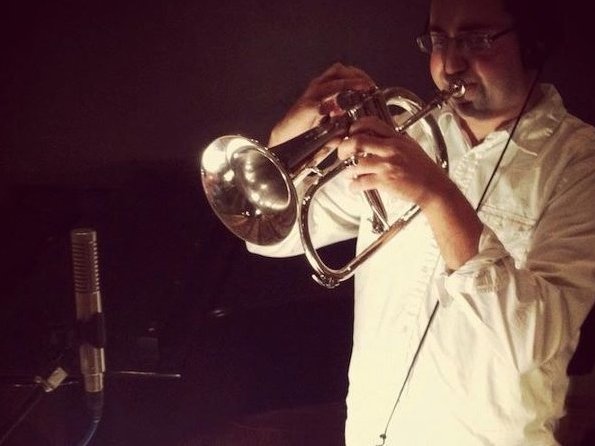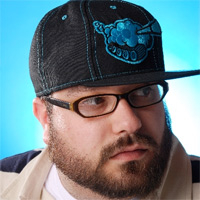Milwaukee's jazz scene is not dead.
It's a breathing, bubbling and working entity that deserves attention – as much attention as the indie rock scene receives.
The players are all over the age spectrum, and their passion to carry the torch of a genre that is constantly pushed aside by radio, pop culture magazines and websites and the slashing of arts funding in the schools is second to none.
One of the long-time names in the Milwaukee jazz scene is trumpeter Jamie Breiwick.
Breiwick released his latest album today, an effort called "Serenity."
On "Serenity," Breiwick puts his warm and passionate take on compositions from names like Henry Mancini, Thelonius Monk, Donald Byrd, Miles Davis and others, with the help of pianist Barry Velleman.
Breiwick talked with OnMilwaukee.com about his new album, the path that jazz is currently on and more.
OnMilwaukee.com: When sitting down to play other people's compositions, how do you make it your own while still paying tribute to the composer?
Jamie Breiwick: I think that is, in part, the beauty of jazz. Interpretation is part of the process; it's inherent to the music. The improvisational element in the music stemming from the African tradition – and clearly evident in every style of American music, spirituals through Kanye – demands that you add yourself to the music – or to "make it your own," as you said. What that means in my case is that I will play these tunes with my individual sound, that only I can produce on the trumpet, bringing with me every bit of vocabulary I've picked up from listening to the masters of my instrument for the past 20 years of my musical life. For example: Miles Davis, Freddie Hubbard, Blue Mitchell, Don Cherry, Kenny Dorham, Clifford Brown, Chet Baker, Lee Morgan, Brian Lynch, Lester Bowie, Roy Hargrove, Terrence Blanchard, Wynton Marsalis, Nicholas Payton, Dave Douglas, Eric Jacobson, Philip Dizack, et al; all these players have informed my own voice, the same way I learned to speak as a child.
First you copy and emulate your parents and siblings, assimilating new words and phrases. Then you begin to form sentences, building your vocabulary and your ability to communicate. Finally you are able to express ideas and thoughts of your own.
Me playing "How Deep is the Ocean?" – while informed by the master musicians I have studied and emulate – is not going to sound the same as Miles or Nicholas Payton playing it because I am not them. My voice is different from theirs, like your voice is different from your mother's or father's.
The compositions are a vehicle for self-expression. The same way Hendrix covers Dylan and puts his distinct stamp on it. I didn't even realize for the longest time that Dylan wrote "All Along the Watchtower" because Jimi's version is so personal. It works the same way in jazz. You keep the basic
song form, harmonic structure, melody, etc., but interpret the composition through the lens of your musical and life experience.
OMC: Why did you pick the songs that you did for your new album "Serenity?"
JB: I like the melodies/chord structures of the compositions. They are fun and challenging to play. They are all tunes I've been playing for a while and am comfortable with, save "Giant Steps." I don't know many who are comfortable with that one and I just sort of learned it recently. I could definitely have used another 10 takes on that one.
OMC: After ruling music for decades, jazz has been relegated to a niche genre. Why have so many people in the younger generations gravitated away from jazz in your opinion?
JB: OK, here's the hot button! So to answer your question in one fell swoop: There are no radio stations playing good jazz consistently – save WMSE on Tuesday mornings; shout out to Dr. Sushi – it's not on television, it's not taught in schools, and it's not covered in the print media the same as other types of music. All that being said, I would strongly disagree with the statement that jazz has been relegated to a niche genre. Ever been to The Jazz Estate on a Friday night? Tonic on a Tuesday night? Nothing niche-y going on there in my humble opinion.
This is a very complex question, though, and I think there are many factors at play here. Let me start with my own experience as an elementary and middle school music teacher. In the 15-plus years I have been teaching music, I can say almost across the board that when exposed to jazz in the right way, kids or whoever, love the music. Period, end of story. I can put on a Miles record, and have a bunch of seventh and eighth graders sitting there just digging it. These kids are hip! They want something different – 90 percent of them, when confronted with Justin Bieber or x pop star, will laugh at me when I bring them up.
I showed this incredible film to every one of my classes last year, "Before the Music Dies." I would highly recommend it to anyone. The film exposes the evils of the recording industry and how pop stars are "produced" – very often without any depth of musical talent or even the slightest hint of musical truth or creativity. Hello? Auto-tune? We had some very candid discussions afterwards, and the majority of the kids really felt the message of the film. It is OK to go against the grain. It is OK to not accept what is force-fed down your throat. It is OK to like something that requires a little bit of thought. I am dealing with kids who are coming to me with no pre-conceived notions about music styles, and sending them on their way with Grant Green, Herbie Hancock, Miles Davis, Charlie Parker, Lou Donaldson, etc. on their iPods, right alongside what you'd expect from a seventh or eighth grader.
Look at the success of "indie" music, bands like Arcade Fire or Wilco, they can be flat-out weird, avant garde. Hell, Nels Cline plays as out as anybody, yet they are selling out shows everywhere. Jazz is not that far a leap from bands like that and if presented the right way, I think that the masses would dig it. I think it is possible that people's perception of what good jazz is might be way off too.
God bless Brian Sanders at the Jazz Estate for keeping the jazz torch burning in Milwaukee. The crowds at the Jazz Estate are very diverse and plentiful on most nights. Jazz music, when presented in the right way – a la Sanders' Jazz Estate – will always have an audience. Brian does it right. He books
cats that can play and have something to say musically, so when people hear it there's a connection there between the audience and the musicians. Or even more than a connection, an exchange of energy. Peep milwaukeejazzvision.org. There is more happening than meets the eye. The Wisconsin Conservatory of Music has an incredible jazz studies program – the new Batterman Jazz Institute – continuing the tradition of the forefathers of Milwaukee jazz, as does the Milwaukee Youth Symphony Orchestra's relatively new jazz studies program founded by Milwaukee jazz education guru Cliff Gribble and directed by Jeno Somlai. UWM began offering its first jazz studies major ever in 2010. Jazz jam sessions are popping up all over town at unsuspecting venues such as Rochambo, Jazz nights at Tonic Tavern are picking up steam, etc. It's not 52nd street New York City in 1950, but there are things happening!
OMC: If you were constructing your dream jam session, who would you have participate in it? They can be dead or alive.
JB: That's tough! I am attracted to musicians who are open-minded musically and who are not afraid to take risks so I think it would have been really amazing to play in Miles' band of the mid 1960s: Wayne Shorter (tenor saxophone), Herbie Hancock (piano), Ron Carter (bass), and Tony Williams (drums). If I could form a band of younger players, cats of my generation, it'd be Brian Blade's Fellowship Band, Brad Mehldau Trio, maybe Ben Allison's band? Roy Haynes! Can I have three or four bands? Elvin Jones, McCoy Tyner, Trane, I don't think I could hang with them, but it'd be fun to try!
OMC: What was it like working with pianist Barry Velleman on the new project?
JB: Barry is a musical genius. I'm not just saying that. Many others have said the same. He is always listening and supporting, which makes him so much fun to play with. You could almost play anything with Barry and he will make it sound right, literally. This quality allows you to play with an incredible sense of freedom; it allows you to take risks and go in directions you might not normally go in, rhythmically or harmonically. I remember meeting Barry for the first time on a wedding gig. We were both hired as sidemen. We were playing during the reception/cocktail hour. I hadn't worked with him before, nor had I heard him play. We hit the first tune and wowza! It was like doing a wedding gig with the likes of Bill Evans or Herbie or something! Just an incredible player. World class.
OMC: What are your plans for the new year to support the album?
JB: Not much. I have an amazing wife, Jessica, and three beautiful sons: Nathan (7), Jack (almost 4), and Nolan (2). I've been playing out three to five nights a week for the last 15 years and I'm going to start slowing down a little bit because I want to be at home more with Jessica and the boys. I have a wonderful gig at Mason Street Grill in the Pfister Hotel every Tuesday and Wednesday night playing duo with pianist Mark Davis. Mark is such a treasure. Talk about world class! I've learned so much from playing with him twice a week for the last year. His depth of knowledge of the jazz tradition is inspiring. I would be completely satisfied musically if that was the only gig I had. So, no world tours, if that's what you mean! I just really wanted to document something with Barry. I asked him if he'd be into recording with me, he said yes. We did the whole record in two hours, one take of every tune except for "Giant Steps" because I totally botched the first take – only moderately botched the second take.
My other project is the band Choir Fight with Aaron Gardner, Steve Peplin, Scott Currier, Bryan Mir and Jeremy Kuzniar. We're ready to do a record soon. Playing out once a month or so. I've really been into doing shows with other bands who are nothing like us at all. We've had a couple recent shows that were really successful at Club Garibaldi and Mad Planet – not your typical jazz venues! So keep an eye/ear out for that band too!
I can't forget to mention the collaboration between the Milwaukee Jazz Vision and the Riverwest Artist Association and the impact of the revitalization of the old Jazz Gallery on Center Street. Monthly jam sessions are held there the first Tuesday of each month and they have monthly jazz concerts. So key! Thanks to Mark Lawson, president of the RAA.
Born in Milwaukee and raised in the Milwaukee suburb of Brown Deer, Concordia University Wisconsin alumnus Poppe has spent the majority of his life in or around the city and county of Milwaukee.
As an advocate of Milwaukee's hip-hop community Poppe began popular local music blog Milwaukee UP in March 2010. Check out the archived entries here.
Though heavy on the hip-hop, Poppe writes about other genres of music and occasionally about food, culture or sports, and is always ready to show his pride in Milwaukee and Wisconsin.



